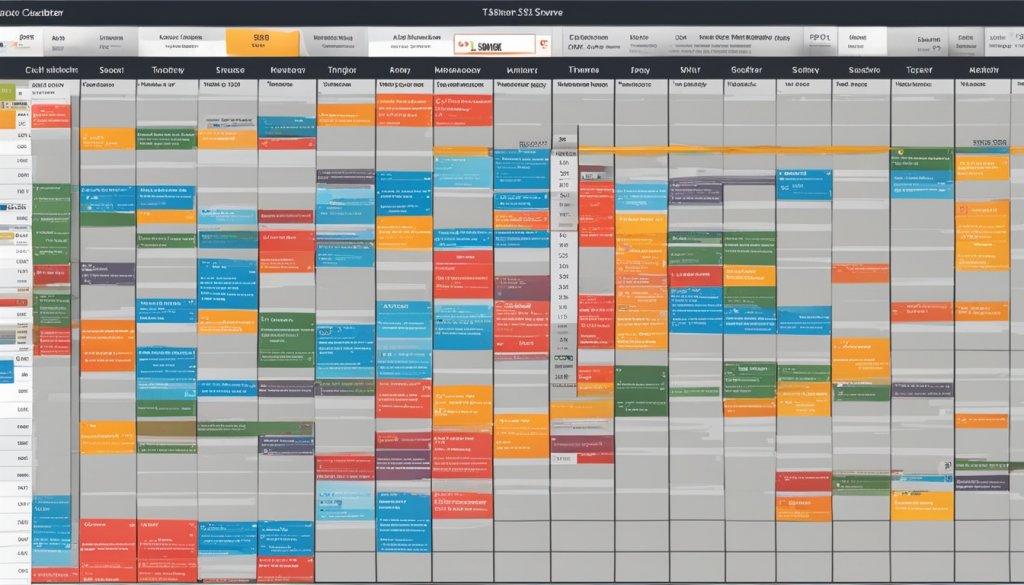Running a field service business is no easy task. Every day brings a new set of challenges that can test our patience and resolve. But it’s through overcoming these challenges that we find our strength and drive our businesses forward.
Let me tell you a story. Last year, I was managing a field service team for a telecommunications company. We were responsible for installing and repairing services for customers in our area. One day, we received a call from a frustrated customer named Sarah. She had been experiencing internet connectivity issues for weeks, and her patience was wearing thin.
We dispatched our technician, Mark, to Sarah’s home. He arrived within the scheduled time frame, armed with his toolkit and a determination to solve the problem. After a thorough examination, Mark identified the root cause: a faulty modem. He quickly replaced it with a new one, ensuring Sarah’s internet connection was stable.
Sarah was relieved and grateful for Mark’s efficient and professional service. She expressed her satisfaction, praising our company’s commitment to customer care. This incident highlighted the importance of addressing customer needs promptly and delivering a high level of service.
In the field service industry, challenges like these are not uncommon. However, by implementing effective solutions, we can overcome these hurdles and excel in our businesses. In this article, I will discuss some of the key challenges faced by field service organizations in 2024 and provide valuable solutions to help you thrive in the coming year.

Key Takeaways:
- Field service businesses face various challenges that can impact productivity and customer satisfaction.
- Adopting and integrating new technologies, embracing servitization, addressing the skills gap, and achieving sustainability goals are crucial
- Implementing the latest technology, developing strong leadership, improving customer communication, and managing inventory effectively are key solutions
- Increasing first-time fix rates, streamlining invoicing processes, improving staff productivity, and utilizing accurate metrics are also essential for success
- By implementing these solutions, field service businesses can overcome challenges and achieve excellence in the coming year
Adopting and integrating new technologies
As the field service industry continues to evolve, many businesses face the challenge of adopting and integrating new technologies into their operations. Legacy systems, siloed processes, and data complexities often hinder this process. However, embracing new technologies can lead to significant advancements in field service solutions.
Implementing innovative solutions such as IoT, remote assistance, wearables, and self-service portals can greatly benefit field service organizations. These technologies enable businesses to streamline processes, improve efficiency, and enhance the overall customer experience.
To overcome the challenge of integrating new technologies, businesses must prioritize modernizing their technology infrastructure. Upgrading from outdated legacy systems to more agile and adaptable platforms is essential. By embracing the speed of technological advancements, field service businesses can optimize their operations and stay ahead of the competition.
“Adopting new technologies is crucial in today’s field service landscape. With the right tools, organizations can enhance service delivery, empower their technicians, and create a seamless customer experience.”
Modernizing Technology Infrastructure
Legacy systems are often the primary obstacle when it comes to adopting new technologies. To eliminate these barriers, businesses should invest in advanced field service solutions that offer compatibility with modern tools and systems. By migrating from legacy systems to more scalable and adaptable technology platforms, organizations can unlock a range of benefits.
Fostering Agile Organizations
In an era of rapid technological advancements, it is essential for field service businesses to foster agile organizations. This involves creating a culture that embraces change and welcomes new technology innovations. By encouraging openness to new ideas and empowering employees to adapt to technological advancements, organizations can promote a proactive approach to adopting and integrating new technologies.
The Importance of New Technologies
Adopting and integrating new technologies is instrumental in staying competitive in the field service industry. These advancements enable businesses to improve operational efficiency, enhance field service solutions, and deliver exceptional customer experiences.
Servitization: selling performance ‘as a service’
Servitization, the shift from selling products to selling performance as a service, poses a challenge for field service businesses. Building a profitable service business model requires integrated processes, data, and applications. Legacy systems, lack of integration, and limited access to data can hinder success.
To overcome this challenge, businesses need to invest in integrated field service solutions that provide a comprehensive platform for managing service operations and supporting servitization strategies. One such solution is Microsoft Dynamics 365 Field Service.
Integrated processes are crucial to servitization as they ensure smooth coordination between different stages of service delivery. By integrating service and product teams, businesses can optimize resources and deliver seamless customer experiences.
Data and applications play a pivotal role in servitization as they enable businesses to capture, analyze, and leverage customer information. By using data-driven insights, businesses can customize service offerings, improve operational efficiency, and drive customer satisfaction.
The power of servitization lies in adopting robust field service solutions like Microsoft Dynamics 365 Field Service that seamlessly integrate processes, data, and applications, enabling businesses to build and sustain a profitable service business model.
Legacy systems can hinder servitization efforts by limiting data access, creating operational inefficiencies, and impeding service transformation. By modernizing their technology infrastructure and adopting agile solutions, businesses can overcome these limitations and successfully embrace servitization.
Investing in integrated field service solutions not only addresses the challenges associated with servitization but also enables businesses to unlock new revenue streams, enhance customer satisfaction, and differentiate themselves from competitors.
Addressing the skills gap and workforce shortage
The field service industry is currently facing the challenges of a skills gap and workforce shortage. With an increasing demand for services and complex technologies, it is crucial for businesses to tackle this issue head-on. The scarcity of skilled technicians and the aging workforce pose significant obstacles to the speed and quality of service delivery.
To overcome the skills gap and workforce shortage, field service businesses must prioritize attracting and retaining capable technicians. By offering competitive compensation packages, professional growth opportunities, and a positive work environment, companies can position themselves as attractive employers and secure top talent. Moreover, investing in training and development programs is essential for bridging the knowledge gap and ensuring employees have the skills necessary to handle advanced technologies.
Additionally, providing access to knowledge and assistance is crucial for supporting technicians in the field. Implementing robust knowledge management systems and digital resources can empower technicians with instant access to troubleshooting guides, equipment manuals, and best practices. This enables them to resolve complex issues efficiently, improving service quality and customer satisfaction.
“By addressing the skills gap and workforce shortage, field service businesses can build a strong and capable workforce, capable of delivering exceptional service.”
Collaboration with educational institutions, trade organizations, and industry experts can also help businesses stay ahead of emerging trends and developments while accessing a fresh pool of talent. Building strategic partnerships for knowledge exchange and fostering mentorship programs will contribute to a more skilled and empowered workforce.

Investing in the Future
Addressing the skills gap and workforce shortage requires a long-term commitment to invest in the future. Field service businesses must embrace continuous learning and development opportunities to propel their technicians forward. By providing ongoing training and upskilling programs, organizations can equip their workforce with the knowledge and skills necessary to thrive in a rapidly evolving industry.
By addressing the skills gap and workforce shortage, field service businesses can build a strong and capable workforce, capable of delivering exceptional service. With the right investments in attracting, retaining, and developing talent, companies can bridge the gap between the demand for services and the available workforce, ensuring sustainable growth and success in the field service industry.
Achieving sustainability goals
As field service businesses strive to meet sustainability goals, reducing their environmental impact and complying with regulations become key objectives. Achieving these goals requires significant changes in business processes, operations, and culture.
One way field service businesses can contribute to sustainability is by optimizing routes to reduce fuel consumption and minimize their carbon footprint. By implementing efficient route planning strategies, businesses can decrease travel distances and lower their environmental impact.
Additionally, adopting green technologies can play a significant role in achieving sustainability goals. Embracing energy-efficient equipment and vehicles can reduce energy consumption and greenhouse gas emissions. Investing in renewable energy sources for powering facilities and using eco-friendly materials in service operations are also effective measures that businesses can take.
“By optimizing routes and adopting green technologies, field service businesses can reduce their environmental impact and contribute to a more sustainable future.”
Implementing recycling or reuse practices is another way to promote sustainability. By encouraging the proper disposal of materials and providing options for recycling, businesses can minimize waste and contribute to a circular economy.
To make sustainable practices a part of their DNA, field service businesses must assess their current practices and identify areas for improvement. This includes analyzing energy and resource usage, waste generation, and emissions. Gathering data and measuring performance against sustainability metrics can provide valuable insights for driving change.
By integrating sustainability initiatives into their operations, field service businesses can not only reduce their environmental impact but also align with customer expectations. Many customers prioritize sustainability and prefer to engage with eco-friendly businesses.
“Adopting sustainable practices is not just an environmental responsibility—it’s a business imperative.”
In conclusion, achieving sustainability goals necessitates significant changes in business processes, operations, and culture. By optimizing routes, reducing fuel consumption, adopting green technologies, and implementing recycling or reuse practices, field service businesses can contribute to a more sustainable future while meeting customer expectations and regulatory requirements.
Improving scheduling accuracy
Scheduling accuracy is a critical aspect of field service operations that requires efficient management. Field service businesses face various challenges such as technician availability, prioritizing calls, and travel time between appointments, all of which contribute to scheduling inaccuracies. These inaccuracies can result in delayed response times, frustrated customers, and decreased productivity.
To address this challenge, implementing advanced field service software can be a game-changer. Field service software offers features that improve scheduling accuracy by providing better visibility into technician availability, customer history, and appointment duration. By leveraging these insights, businesses can make informed scheduling decisions and reduce the likelihood of overlaps or conflicting appointments.
One significant advantage of utilizing field service software is the integration of smart route technology. This technology optimizes appointment scheduling by minimizing travel time and ensuring technicians arrive at their destinations promptly. By optimizing routes, businesses can save on fuel costs, increase overall operational efficiency, and provide timely service to customers.
By adopting field service software and harnessing the power of smart route technology, field service businesses can greatly enhance their scheduling accuracy. This, in turn, leads to improved customer satisfaction, streamlined operations, and increased technician productivity.
“The implementation of a robust field service software solution enables us to effectively manage our scheduling operations and ensure accurate, on-time service delivery. The smart route technology has dramatically reduced our travel time between appointments, allowing us to efficiently serve our customers and meet their expectations.” – Sarah Thompson, Field Service Manager at XYZ Solutions
Shortening ETA windows for customers
Long ETA windows can lead to customer dissatisfaction and missed business opportunities. To stand out from competitors, it is crucial for field service businesses to shorten appointment windows and provide more accurate time frames for customer appointments. This can be achieved through the use of field service scheduling software.
Field service scheduling software allows businesses to track the progress of technicians in real-time, ensuring efficient service delivery. By utilizing this technology, businesses can provide customers with updates on technician arrival times, keeping them informed and reducing uncertainty.
Shortening ETA windows not only improves customer satisfaction but also creates a more efficient service experience. Customers appreciate accurate appointment windows and are more likely to choose a field service business that values their time and provides reliable service.
Implementing field service scheduling software is a strategic move for businesses looking to enhance customer satisfaction and optimize their operations. By leveraging this technology, field service businesses can improve customer experiences, drive business growth, and stay competitive in the market.

Improving Customer Satisfaction with Accurate Appointment Windows
“Shortening ETA windows for customer appointments has a profound impact on customer satisfaction. With accurate appointment windows provided by field service scheduling software, businesses can enhance their customers’ overall experience.”
Enhancing customer communication
Effective customer communication is crucial for creating a positive service experience. It is essential to keep customers informed and engaged throughout their journey with your field service business. One of the most efficient ways to achieve this is through automated notifications.
“Automated notifications provide timely updates and show customers that their business is valued.”
By sending appointment confirmations, reminders, and post-service follow-ups via email or text, you can improve communication and enhance the overall customer experience. These automated notifications ensure that customers stay informed about their appointments and receive necessary updates promptly.
Furthermore, conducting customer surveys is a valuable strategy to gather feedback and continuously improve your services. By actively seeking feedback, you demonstrate your commitment to providing an exceptional customer experience.
Automated Notifications: Keeping Customers Informed
Automated notifications play a crucial role in optimizing customer communication. Sending appointment confirmations helps customers feel assured that their service request has been received and scheduled. Reminders ensure that customers remember their appointments and can plan accordingly. Post-service follow-ups provide an opportunity to gather feedback on the service provided and address any concerns or issues that may have arisen.
Enhancing the Customer Experience with Surveys
Customer surveys allow you to gather valuable insights into customer satisfaction and identify areas for improvement. By understanding your customers’ needs and preferences, you can tailor your services to better meet their expectations, ultimately enhancing the customer experience. Consider incorporating customer surveys at various touchpoints throughout the customer journey to capture feedback and make data-driven decisions for improvement.
Enhancing customer communication through automated notifications and customer surveys is essential to drive customer satisfaction and loyalty. By keeping customers informed, engaged, and actively seeking their feedback, you can create a seamless and personalized service experience.
Streamlining inventory management
Inventory management is a common challenge for field service businesses, often resulting in inventory mistakes and inefficient operations. However, by embracing digitization and implementing a field service software with a centralized digital inventory, businesses can streamline their inventory management processes and achieve greater control and visibility.
A crucial benefit of digitizing inventory is the ability to track and monitor inventory levels in real-time across multiple technicians and vehicles. With a centralized system, technicians can access up-to-date information on available parts and ensure they have the necessary supplies for each appointment. The result is reduced appointment times and improved customer satisfaction as technicians arrive fully equipped to address the issue at hand.
Furthermore, field service software equipped with a centralized digital inventory enables businesses to optimize their stock levels by accurately forecasting demand. With better visibility into inventory, organizations can avoid overstocking or understocking, minimizing the risk of service disruptions and costly delays.
“Implementing a field service software with centralized digital inventory allows for better tracking and control of inventory across multiple technicians and vehicles.”
By leveraging field service software, businesses can also automate inventory management tasks, such as reordering and inventory replenishment. With automated processes in place, organizations can reduce the time and effort spent on manual inventory management, enabling staff to focus on more value-added activities.
Overall, the digitization of inventory management through a centralized digital inventory system powered by field service software can optimize operations, minimize errors, and improve productivity for field service businesses.
Improving staff productivity and utilizing metrics
Monitoring and improving staff productivity is essential for field service businesses. By implementing innovative field service management software, like Salesforce Field Service, businesses gain access to comprehensive data on staff performance, enabling them to track and analyze accurate metrics. These metrics include appointment completion time, first-time fix rates, and technician invoicing, giving businesses valuable insights into their operations.
This data-driven approach allows businesses to identify specific areas for improvement, invest in targeted training, and make informed decisions to enhance staff productivity. By utilizing accurate metrics, businesses can measure their performance, set realistic goals, and make continuous improvements to optimize their operations.
With field service management software, businesses can streamline their processes, automate tasks, and empower their staff with the right tools and resources. By providing technicians with mobile access to real-time information, such as work orders, equipment details, and customer history, businesses can enhance efficiency, reduce errors, and deliver exceptional service.
Improving staff productivity and utilizing metrics
Monitoring and improving staff productivity is essential for field service businesses. By implementing innovative field service management software, like Salesforce Field Service, businesses gain access to comprehensive data on staff performance, enabling them to track and analyze accurate metrics. These metrics include appointment completion time, first-time fix rates, and technician invoicing, giving businesses valuable insights into their operations.
This data-driven approach allows businesses to identify specific areas for improvement, invest in targeted training, and make informed decisions to enhance staff productivity. By utilizing accurate metrics, businesses can measure their performance, set realistic goals, and make continuous improvements to optimize their operations.
With field service management software, businesses can streamline their processes, automate tasks, and empower their staff with the right tools and resources. By providing technicians with mobile access to real-time information, such as work orders, equipment details, and customer history, businesses can enhance efficiency, reduce errors, and deliver exceptional service.
See how FieldAx can transform your Field Operations.
Try it today! Book Demo
You are one click away from your customized FieldAx Demo!
FAQ
What are the solutions for field service businesses in 2024?
The solutions for field service businesses in 2024 include implementing the latest technology, developing strong leadership, improving customer communication, managing inventory effectively, increasing first-time fix rates, streamlining invoicing processes, improving staff productivity, and utilizing accurate metrics.
How can field service businesses adopt and integrate new technologies?
Field service businesses can adopt and integrate new technologies by modernizing their technology infrastructure, fostering agile organizations, and embracing the speed of technological advancements. Solutions such as IoT, remote assistance, wearables, and self-service portals can greatly benefit field service organizations.
What is servitization and how can field service businesses address it?
Servitization is the shift from selling products to selling performance as a service. Field service businesses can address servitization by investing in integrated field service solutions, like Microsoft Dynamics 365 Field Service, that provide a comprehensive platform for managing service operations and supporting servitization strategies.
How can field service businesses address the skills gap and workforce shortage?
Field service businesses can address the skills gap and workforce shortage by focusing on attracting and retaining capable technicians, providing access to knowledge and assistance, and investing in training and development programs. Building a strong workforce is essential for improving the speed and quality of service delivery.
How can field service businesses achieve sustainability goals?
Field service businesses can achieve sustainability goals by reducing their environmental impact, complying with regulations, and meeting customer expectations. This can be done by optimizing routes, reducing fuel consumption, adopting green technologies, and implementing recycling or reuse practices.
How can field service businesses improve scheduling accuracy?
Field service businesses can improve scheduling accuracy by implementing field service software that provides better visibility into technician availability, customer history, and appointment duration. Software with smart route technology can optimize appointment scheduling to minimize travel time and keep technicians on schedule.
How can field service businesses shorten ETA windows for customers?
Field service businesses can shorten ETA windows for customers by leveraging field service scheduling software to track technician progress in real-time and provide customers with updates on technician arrival times. This can significantly improve customer satisfaction and create a more efficient service experience.
What can field service businesses do to enhance customer communication?
Field service businesses can enhance customer communication by utilizing automated notifications throughout the customer journey. Sending appointment confirmations, reminders, and post-service follow-ups via email or text can improve communication and show customers that their business is valued. Conducting customer surveys can also gather feedback to continuously improve the customer experience.
How can field service businesses streamline inventory management?
Field service businesses can streamline inventory management by implementing field service software with centralized digital inventory. This allows for better tracking and control of inventory across multiple technicians and vehicles. Technicians can access real-time inventory information and ensure they have the necessary parts for each appointment, reducing appointment times and improving customer satisfaction.
How can field service businesses improve staff productivity and utilize metrics?
Field service businesses can improve staff productivity by utilizing field service management software that provides comprehensive data on staff performance. This enables businesses to track metrics such as appointment completion time, first-time fix rates, and technician invoicing. By utilizing accurate metrics, businesses can measure their performance and make data-driven decisions for continuous improvement.
Author Bio
Co-Founder & CMO at Merfantz Technologies Pvt Ltd | Marketing Manager for FieldAx Field Service Software | Salesforce All-Star Ranger and Community Contributor | Salesforce Content Creation for Knowledge Sharing






